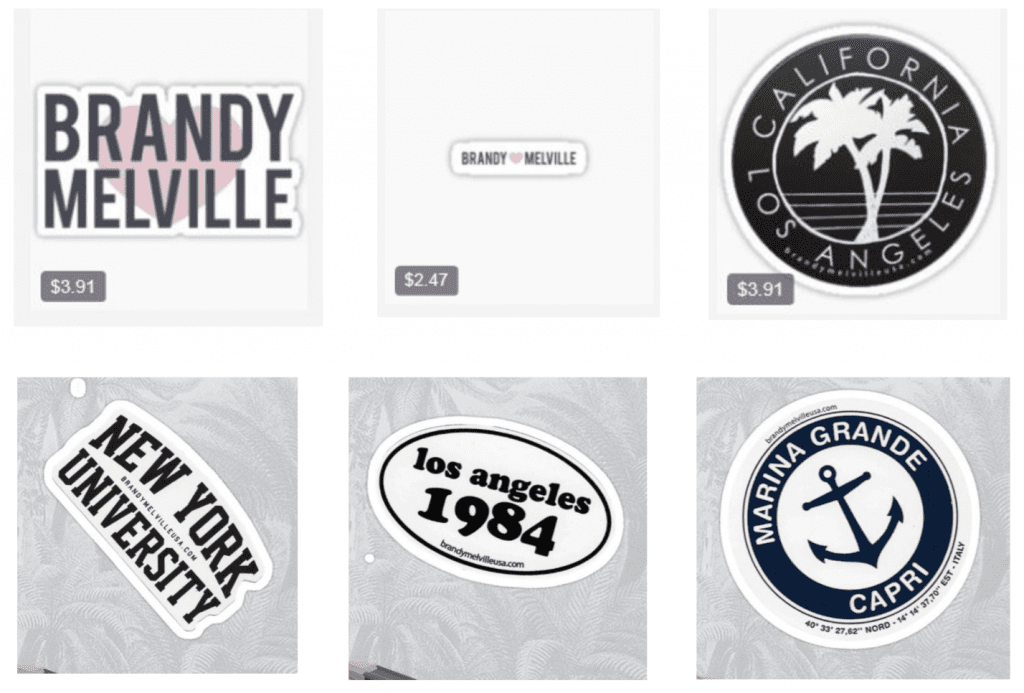A federal appeals court has handed down a mixed ruling in a trademark case that pits Brandy Melville against Redbubble over print-on-demand products. In a decision on July 24, the U.S. Court of Appeals for the Ninth Circuit partially affirmed the motion for judgment as a matter of law that the district court granted after a jury found that Redbubble was liable for contributory trademark infringement and counterfeiting, and awarded Melville more than $500,000 in damages. The teen-favored retailer first waged its trademark infringement suit against the Melbourne, Australia-based online marketplace in 2019, accusing it of allows users to design and sell products, including products bearing Brandy Melville trademarks.
Some Background: Brandy Melville alleged in its complaint that despite sending a letter to Redbubble in 2018 to put it on notice that Brandy Melville trademarks – including the “Heart” and “Lightning” marks, as well as various “Brandy Melville” marks – were being counterfeited, the platform did not remove the listings at issue, and in fact, continued to offer up and profit from the sale of counterfeit goods, thereby, engaging in contributory trademark infringement and counterfeiting. Siding with Melville at trial in June 2021, the jury awarded the brand $520,000 in damages in connection with its contributory infringement and counterfeiting claims.
As the Ninth Circuit summarized in its recent decision, “After the jury’s verdict, the district court granted Redbubble’s motion for judgment as a matter of law on the contributory counterfeiting claim for the [Brandy Melville] Heart Mark, [and] let the verdict stand for the remaining claims,” while denying Brandy Melville a permanent injunction, attorney fees, and prejudgment interest. (The C.D. Cal. judge also reduced the jury award by $300,000 on the basis that the evidence presented by Brandy Melville did not show that the products on Redbubble included marks that were “remotely similar” to its “Brandy Melville Heart Mark.”)

Both parties appealed, with Redbubble – whose model enables independent artists to upload their artwork to its website, where consumers can purchase products, from t-shirts to stickers, bearing the designs – seeking a decision from the Ninth Circuit on the knowledge standard governing contributory trademark liability, and Brandy Melville arguing that it was entitled to post-trial relief.
Standard for contributory trademark liability – Vacating the district court’s motion for judgment as a matter of law in part and denying it in part, the Ninth Circuit held that “a party is liable for contributory infringement when it continues to supply its product to one whom it knows or has reason to know is engaging in trademark infringement.” A party meets this standard, the Ninth Circuit panel said, if it is “willfully blind to infringement.” Agreeing with other circuits, judges held that “contributory trademark liability requires the defendant to have knowledge of specific infringers or instances of infringement,” and thus, “general knowledge of infringement on the defendant’s platform, even of the plaintiff’s trademarks, is not enough.”
With that legal standard mind, the Ninth Circuit remanded Redbubble’s back down to the district court for motion for reconsideration.
Contributory trademark counterfeiting – Turning to the district court’s judgment as a matter of law for Redbubble on Melville’s contributory trademark counterfeiting claim with regards to the Melville “heart mark,” the Ninth Circuit maintained that the district court did not evaluate the evidence of likelihood of confusion under the proper standard. In particular, the district court “glossed over whether the Heart Mark was so strong and distinctive that its presence alone caused confusion,” according to the Ninth Circuit. At the same time, the Ninth Circuit panel found that the district court failed to address “whether, based on the record, confusion could have resulted because the products on Redbubble’s website bearing the Heart Mark were the kinds of trademarked goods that Brandy Melville sells,” and instead, focused on whether the parties’ products were “stitch-for-stitch” copies.
Permanent injunction – The Ninth Circuit’s panel also vacated the district court’s denial of Brandy Melville’s motion to permanently enjoin Redbubble from “referencing, mentioning, and using BRANDY MELVILLE, Brandy Melville’s registered trademarks, and Brandy Melville’s unregistered variations.” In siding with Brandy Melville here, the appeals court disagreed with the district court’s determination that the fact that Brandy Melville waited a year between sending the cease-and-desist to Redbubble and filing suit against the company “rebutted a statutory presumption of irreparable harm, and the remaining testimony from a Brandy Melville employee could not establish irreparable harm.” The panel held that the district court did not err by considering the delay, but it abused its discretion in determining that the statutory presumption was rebutted and that there was no irreparable harm because it improperly discounted the relevance of future harm.
The panel remanded the injunction issue for the district court to reconsider after “redetermining Redbubble’s liability, how the existence of future harm affects irreparable harm, and the other factors governing injunctive relief.”
THE BIGGER PICTURE: Not the only case that Redbubble has faced in recent years, as the platform was named as the defendant in a number of other trademark suits, which have addressed “important questions about whether Redbubble’s approach to online sales gives rise to liability for trademark infringement, trademark counterfeiting, and even right of publicity violations,” Debevoise & Plimpton’s Megan Bannigan previously wrote. Among those cases: the one waged against Redbubble by the Ohio State University (“OSU”), in which the school alleged that Redbubble was liable for direct trademark infringement based on the sale of merchandise on the Redbubble e-commerce website that infringed various OSU trademarks.
The U.S. Court of Appeals for the Sixth Circuit reversed the district court’s grant of summary judgment in favor of Redbubble in that case in February 2021 and remanded the matter back to the district court for further consideration, holding that Redbubble was not merely a “passive facilitator” of infringing goods bearing good and acted “more like a company that creates knock-off goods.”
In another notable case, video game developer Atari sued Redbubble for copyright and trademark infringement. However, in that case, the jury sided with Redbubble in November 2021, finding that the individual designers – and not the platform – were liable for infringement.
The case is Y.Y.G.M. SA d.b.a. Brandy Melville v. Redbubble, Inc., 2:19-cv-04618 (C.D.Cal).














